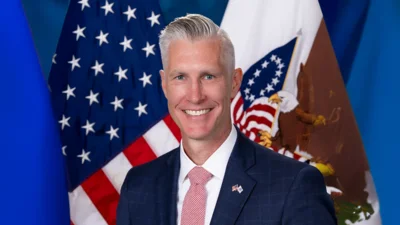The publication is reproduced in full below:
Budget
Mr. President, there is an old saying that there aren't a lot of atheists in foxholes.
In my experience, there aren't a lot of unyielding, uncompromising, fiscally conservative, so-called budget hawks when a disaster hits. It gets personal. When tornadoes rip across your State or hurricanes devastate your community, when a cold snap takes down the electric grid in your State, when blazing heat sets off raging wildfires, when a freight train hauling toxic chemicals derails and explodes into a raging fireball, you don't find a platoon of Ayn Rand-quoting ideologues that really come to the scene and want to be heard.
People want to see FEMA and other government Agencies on the scene helping as quickly as possible. They want to know that their government is there to help when it is needed.
When it gets right down to it, we Americans face a fundamental choice. Do we want a Federal Government that is there when we need a hand or do we want a government that will preach to us: Sorry. You are on your own, Mr. Taxpayer?
Do we want a government that is farsighted enough to plant the American flag on new industries and inventions for the future or do we plan on leaving these transformative discoveries--the Moonshots of this century--to China?
President Biden told us last week where he stands on these basic questions when he proposed his budget to Congress. It is a plan that protects Social Security, strengthens Medicare, and adds 25 years of additional solvency to the Medicare Program.
The President's budget plan gives working families help with the basics--affordable, reliable healthcare coverage, including savings on prescription drugs, which the Democratic leader just noted when it came to insulin.
The President's budget invests in affordable housing and quality childcare. It invests in community colleges to educate skilled workers that our economy desperately needs and helps students land good-paying jobs and get a start on a 4-year degree.
The President's budget restores the enhanced child tax credit, which helped cut poverty among children in the United States in half when we included it during the pandemic. We are, in fact, the richest Nation on Earth, yet, shamefully, we have the highest child poverty rate among all advanced nations. If the superwealthy can claim tax breaks on their yachts, surely we can find affordable tax credits to help working families care for their kids.
President Reagan called another part of the Tax Code--the earned income tax credit--the best anti-poverty program ever invented. President Biden is proposing to make the earned income tax credit for childless workers permanent to lift millions of low-wage Americans out of poverty. Isn't that something that should be our aspiration in this country as a high priority? If you say you believe in the dignity of work, if you say you respect men and women who take the bus early in the morning, working maybe two or even three jobs to make ends meet, here is a chance to show our respect for work--support the earned income tax credit.
President Biden's budget includes continued funding for a Cancer Moonshot to end cancer as we know it. What family in America hasn't known the heartache personally or among friends or family members and frequently the financial devastation of cancer? Not many.
I hope people not only embrace the administration's Cancer Moonshot but will continue the 5-percent real growth in medical research--
including the National Institutes of Health--that this Senate has supported on a bipartisan basis for nearly a decade.
I went out to National Institutes of Health about 10 years ago, and I met with one of the greatest living Americans--and I say that without reservation--Dr. Francis Collins. He was the head of the NIH under Presidents of both political parties and did a remarkable job. Among other things, he was one of the key elements and contributors in mapping the human genome. That has just transformed a whole area of medical research.
I said to Dr. Collins when I went out to see him: I want to help the National Institutes of Health with medical research. I know there was a time when a bipartisan coalition doubled your budget.
That coalition should be remembered on the floor of the Senate. It was Arlen Specter, a Republican from Pennsylvania; Tom Harkin, a Democrat from Iowa; and John Porter, a Republican Congressman from the North Shore of the State of Illinois. The three of them got together and doubled the budget for the National Institutes of Health.
I said to Dr. Collins: I want to do something that helps you. What can I do?
He said: Work to give us 5 percent real growth every single year.
Do you know why?
He said: Our researchers aren't sure you are going to be there next year, Congress. They are not sure you are going to fund their projects. So they don't follow through to the end, as they should. They lose patience and end up in some other place. If you can give them a reliable budget each year for medical research, they will continue their research and find dramatic breakthroughs.
In the words of Dr. Collins, he said: We can light up the scoreboard if you will make that commitment.
I came back here and talked to a number of my colleagues. I talked to Roy Blunt--now retired--from the State of Missouri. I talked to Patty Murray--of course still serving here and now chairing the Senate Appropriations Committee--from the State of Washington. I spoke to Lamar Alexander, a Republican from Tennessee. The four of us got together and put together a bipartisan team, and we achieved that goal of 5 percent real growth for 8 years. We went from $30 billion at the NIH to $40 billion at the NIH, and it makes a big difference. It made a big difference when the pandemic struck.
We are doing things now that really do improve the likelihood of finding cures for many diseases, and I want to continue with that. I am glad to report that President Biden's budget does just that. That is the kind of commitment we need to make in the Senate on a bipartisan basis for at least another decade.
The President's plan also strengths border security and the U.S. immigration system. There is no excuse why we have not rewritten our terrible immigration laws, our broken immigration system, in almost 30 years--30 years, since Ronald Reagan was President. That was the last time we ever agreed on any significant changes in immigration policy.
The world has changed dramatically. America has changed, and we still are laboring under the old laws, which do not meet today's needs. We need to do more. It is not enough to just appropriate money for border security; we need a plan that makes sense, that reflects our values as a nation of immigrants, which reflects the values we share when it comes to our future and recognizes the reality that many of these immigrants seeking to be part of the United States are going to make a significant difference not only in the lives of their families but in the lives of Americans all over.
These are people who have amazing energy and determination. I have yet to meet one of these new immigrants in my State of Illinois who is asking me where the welfare office is. They are asking me where they can go to work, and they are ready to roll up their sleeves and start working immediately. They are wonderful, ingenious, innovative, hard-
charging people, and we need them in our future. It is time to wake up to the reality.
Having a system of orderly immigration in this country is the best thing to make sure we keep our labor pool strong and the best innovation available in entrepreneurial pursuits.
The President's budget also increases defense spending to ensure that we can deter any threats from China, Russia, Iran, or any other country that threatens us. It maintains our commitment to the brave fighters and people of Ukraine who are on the frontline of freedom in today's world.
I just read over the weekend where the Governor from the State of Florida really questioned whether we ought to be doing anything to help the people in Ukraine. I couldn't believe it when I read it, but I guess in politics, almost anything can happen.
To think that we would turn our backs now on these brave Ukrainians who for more than a year have fought off Vladimir Putin and his thugs invading their country in an unprovoked invasion is just, in my mind, mindless. If we can't stand up for the values of the Ukrainian people and stop this kind of ruthless, war-crime behavior by Vladimir Putin, shame on us. The United States needs to stand with the people of Ukraine, who are literally giving their lives on a daily basis for the future of their nation.
I might add, the President's budget honors Americans' commitment to our military veterans, boosting investments in veterans' health and funding the PACT Act, which is going to allow those who were injured in service to our country by burn pits, for example, an opportunity to get the best quality medical care and to care for veterans sickened by service-
connected exposure to toxic hazards.
This is important: According to the White House, if you earn less than $400,000 a year, the President's budget won't raise your taxes one dollar. That bears repeating. If your family earns less than $400,000 a year, your taxes under the President's budget will not go up one penny. He made that promise when he ran, and he has stuck with it.
The President pays for this plan by making the ultrawealthy, over
$400,000, and big corporations finally pay their fair share. When 55 of the largest corporations in America paid no taxes--zero--last year, that is not a conservative precept; that is a big con, and it is not fair.
Now, we know the President's plan is just an opening bid of what promises to be a long, complicated budget process. We will undoubtedly see alternative proposals from both sides of the aisle. That is the nature of negotiations and debate. But it does take two sides.
I have to join with the Democratic leader in the Senate to say: Speaker McCarthy, where is your plan? Where is your budget? You talk big, but you don't produce anything. We want to see it.
During the last administration, our Republican colleagues voted to add nearly $8 trillion to the national debt. From the last administration was the single-largest increase in America's national debt than any other previous President. That is nearly one-quarter of all the debt accumulated since the beginning of this Nation. It happened in the last 4 years under the previous President. Most of the
$8 trillion in new debt was piled on before the pandemic. A lot of it was spent on tax cuts for the wealthiest people in America and the corporations they own.
Now they say they want to eliminate the deficit in a decade. As Senator Schumer said earlier, it just doesn't pass the laugh test, let alone the math test.
What is the plan to do that? Put it on paper. Put it on the table, and let's see it, Speaker McCarthy. Are you going to cut education? healthcare? medical research? aid for veterans? FEMA?
The President's plan is on the table. Republicans have a responsibility to come up with a credible, serious counteroffer, not just bumper sticker slogans.
SOURCE: Congressional Record Vol. 169, No. 47
The Congressional Record is a unique source of public documentation. It started in 1873, documenting nearly all the major and minor policies being discussed and debated.
Senators' salaries are historically higher than the median US income.





 Alerts Sign-up
Alerts Sign-up